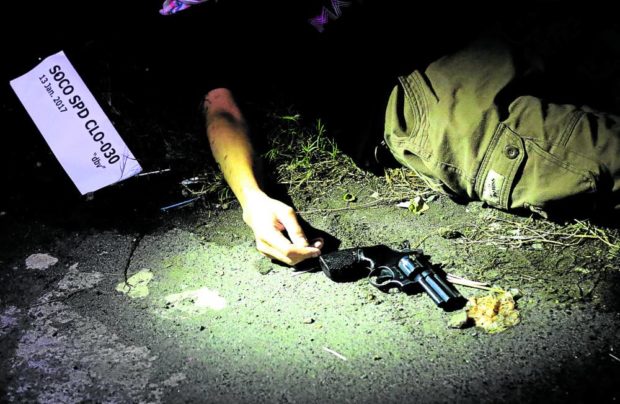SC denies plea for probe of drug war killings

INQUIRER FILE PHOTO
MANILA, Philippines — The Supreme Court has denied a petition seeking to compel the Department of Justice (DOJ), Philippine National Police, and Commission on Human Rights (CHR) to investigate the more than 6,000 killings of suspects in police custody that occurred during the deadly drug war ordered by former President Rodrigo Duterte.
In a nine-page decision penned by Associate Justice Maria Filomena Singh, who was Duterte’s last appointment to the high court, the Supreme Court dismissed the petition of lawyers Anna May Baquirin, Mary Jane Real, Maria Lulu Reyes, Joan Dympha Saniel, and Evalyn Ursua because they sought the wrong remedy and failed to prove their allegations.
The five petitioners asked the high court in 2017 to issue a writ of continuing mandamus to compel then-PNP chief Ronald dela Rosa, CHR Chair Jose Gascon (now deceased), and former Justice Secretary Vitaliano Aguirre II to perform their duties and investigate the killings in police custody of suspects arrested in the course of Duterte’s war on drugs.
When suggestions arose to file charges against Duterte before the International Criminal Court, the PNP officially acknowledged that there were more than 6,000 such incidents, but the DOJ was already investigating more than 50 of the killings in police custody. To date, only two of the 50 investigated killings have been successfully prosecuted.
In the SC ruling, which was promulgated in July but released to media only on Friday, the high court ruled that a writ of continuing mandamus is a remedy only available to environmental cases and cannot be used in cases arising from the anti-illegal drug operations of the government.
‘No concrete proof’
“A writ of mandamus is a remedy granted by law when any tribunal, corporation, board, officer, or person unlawfully neglects the performance of an act, which the law specifically enjoins as a duty resulting from an office, trust, or station, or unlawfully excludes another from the use or enjoyment of a right or office to which such other is entitled,” read Singh’s ruling.
Such “duty,” the decision explained, must be required to be performed under the law and must be ministerial and a writ of continuing mandamus can only prosper if it is “shown that there is no other plain, speedy, and adequate remedy in the ordinary course of law.”
But the five petitioners, the court said, failed to establish the respondents’ neglect of their duties, or that the duties were ministerial, or that there was no other remedy available under the ordinary course of law.
“Besides conjectures and conflicting statements, the petitioners offered no concrete proof that the respondents [were] remiss in their duties,” the court said.
“[The petitioners’] bare allegations cannot be given credence, all the more so with respect to the CHR, as Gascon submitted certified true copies of the CHR’s records for each region on their investigations on the extrajudicial and drug-related killings, and the list of trainings they conducted for the police and military sectors from 2016 to 2017,” the high court press release said quoting the decision.